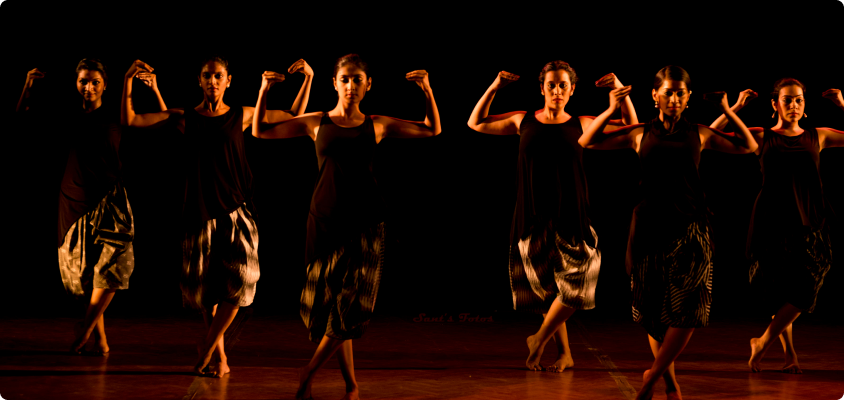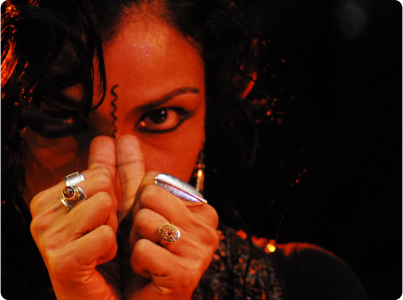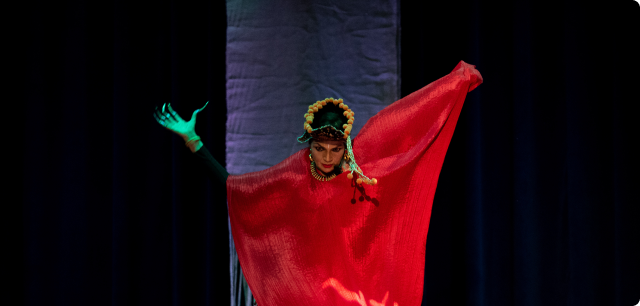'It's a political act to decide to be a performing artiste'
With over two and half decades of experience as choreographer, renowned performer, writer, speaker and cultural mentor Dr. Anita Ratnam has created a multitude of works that have been performed to great acclaim. The active repertoire that has toured in India and internationally, offers a glimpse into the rich and complex choreographies that Anita has been developing over the years along with the Arangham Dance Theatre.
Naachiyaar Next is a re-telling of Dr. Anita Ratnam's production
of Naachiyar that premiered in 2003. In keeping with Anita's
style, it features unconventional verses from Andal, the 9th
century mystic poet of Tamil Nadu who was elevated to goddess
status within few centuries of her birth. The work embodies a
feminist reading of Andal, whose poems have come to represent
female desire, personal Bhakti and daring transgression across
the borders of conformity
Credits
Credits Concept, Choreography and Sound Design: Dr.
Anita Ratnam
Performance: Archana Raja, Shambavi Jagadish,
Sushmita Suresh, Simran Sivakumar, Reshma G, Sruthy Anand,
Nadhini G S, Madhumita Sriram, Sridhar Vasudevan Madhusudhanan
Kalaichelvan
Nattuvangam: L Subhasri Ravi
Percussion: N K Kesavan
Flute: R. Athul Kumar
Veena: Anjani S
Vocals: A V R Randhini, A V R Roshni
Lighting:Victor Paulraj
Costumes: Sandhya Raman
Props: Y Mohan
85 minutes
Andal Andal is a multifaceted representation of the Tamil
poet-saint Andal that conceptualises her with two contrasting
faces. Brought alive by her poetry and the story of her life,
the inner Andal is conflicted, depressed, fiery, and spirited
whereas the outer Andal is obedient, calm and dutiful. First
performed by Dr. Anita Ratnam and Pritha Ratnam in 2011, Andal
Andal will henceforth be performed by a new duo.
Credits
Performance: Dr. Anita Ratnam and Pritha Ratnam
Direction and Choreography: Hari Krishnan and Dr.
Anita Ratnam
Music: Sudha Raghuraman
Costumes: Sandhya Raman
Sets and visual design: Rex
Lighting: Victor Paulraj
Vocals: Sharanya Krishnan, Anusha Pradeep
Nattuvangam:L Subhasri
Vocal: A V R Randhini, A V R Roshni
Flute: G Raghuraman
Mridangam: N K Kesavan
While Sita has been revered as a paragon of virtue, patience,
and resilience, A Million Sitas seeks to explore the
multifarious identities and perspectives of characters in the
Ramayana with a political lens. Dr. Anita Ratnam uses costume,
sound and her signature movement style to retell the stories of
Sita and four other female characters in the Ramayana -
Mandodhari, Manthara, Surpanakha, and Ahalya, characters that
are often overlooked despite their significant contribution to
the epic.
Credits
Choreography: Hari Krishnan in collaboration with
Dr. Anita Ratnam
Performance: Dr. Anita Ratnam
Vocals: Lakshmi and Subhiksha Rangarajan
Violin: Viji Krishnan
Multi percussion: NK Kesavan
Music Consultants: Anil Srinivasan and Vedanth
Bharadwaj
Costume and Visual Design: Rex
Research and Text:Dr. Anita Ratnam and Rex
Lighting Design: Victor Paulraj
Ma3Ka is a performance that embodies a renewed feminist ideal
through the personas of Hindu goddesses Saraswati, Lakshmi, and
Meenakshi, who are known for their knowledge, fertility, and
strength. The piece is a combination of devotion and resistance,
and it effectively achieves both goals with its authentic
autobiographical approach. Anita's personal storytelling and her
unique movement style, which she has honed over many years,
infuse the various aspects of the feminine divine with a
personal touch. This results in a multifaceted expression of
womanhood that is both powerful and deeply personal.
Credits
Concept, Choreography and Sound Design: Dr. Anita
Ratnam
Choreography, Direction: Hari Krishnan
Visual Design: Rex
Set and Lighting Design: Mithran Devanesen
Music Director: Anil Srinivasan
Spoken word / Narration: Revathy Sankkaran
Violinist: Viji Krishnan
Mridangist and Composer of jathis for Meenakshi:
K.S.R. Anirudha
Assistant Music Director and Sound Engineer:
Vedanth Bharadwaj
Karnatic vocalist: Subhiksha Rangarajan
Multi percussions for prologue and Lakshmi:
Darbuka' Siva
Aniruddhan Vasudevan: Darbuka' Siva
Asma Menon: Painter and Artiste
Faces brings us closer to familiar cultural icons using emotions
and sentiments as an anchor, the performance uses different
ragas and moods to reflect a specific emotional state. Dr. Anita
Ratnam uses sound, light and costume to tell a range of stories
that relate to different aspects of human emotions and
experience. The performance features various dance styles,
including Bharatanatyam, Anita's signature movement style, and
with music and visuals, the performance becomes a multi-sensory
experience
Credits
Concept, Choreography and Sound Design: Dr. Anita
Ratnam
Director/Dramaturgy: Aparna
Music Arrangement/Direction: Anil Srinivasan
Associate Music Director: Vedanth Bharadwaj
Songs: O. S. Arun, Sikkil Gurucharan, Revathy
Sankkaran, Subhiksha Rangarajan
Voices: Aniruddhan Vasudevan, L Subhasri, Dr. Anita
Ratnam S
Set Design: Dipankar Mukherjee, Pangea World
Theater, Minneapolis
Costume Design: Sandhya Raman
Costume Assistant: Alexander, Ranjana Tailors
Lights: Aiyappan
Neelam is a selection of compositions drawn from ritual and
temple texts in praise of lord Vishnu as interpreted by
Bharatanatyam dancer Dr. Anita Ratnam in a new light. The
soundscape is inspired by the meditative corridors of Vishnu
temples and the costume and visual design reflect the
androgynous qualities of Vishnu and Lakshmi. The performance is
woven around Nambi and Sri, Andal and Madhusudhana, Krishna and
Radha and finally Rama and Sita
Credits
Concept, Choreography and Sound Design: Dr. Anita
Ratnam
Choreographic consultant: Hari Krishnan (inDance,
Canada)
Music design: Anil Srinivasan, KSR Aniruddha
Voice: Sikkil Gurucharan, O S Arun
Sacred chant: Pradeep Chakravarthy & Revathy
Sankkaran
Costume & visual design: Rex
Lighting design: Victor Paulraj
75 minutes
A solo operatic collaboration between Dr. Anita Ratnam and Hari
Krishnan (inDANCE, Canada), 7 Graces develops Anita's
perspectives on Goddess worship and the intersection of Indian
feminism. The nonlinear minimalistic work uses mythology as
metaphor and draws from a rich kinetic landscape that includes
Bharatanatyam, Chinese Wu-Shu martial arts, Modern Dance,
Tibetan Buddhist liturgical dance and Zen Buddhism.
Credits
Produced by: Dr. Anita Ratnam for Arangham
Trust
Performance co-choreography: Dr. Anita Ratnam
Choreography/Direction: Hari Krishnan
Research: Arvind Iyer
Sound Design: Suresh Gopalan, Anil Srinivasan, Hari
Krishnan & Dr. Anita Ratnam
Studio: Charsur Digital Work Station, Chennai
Lighting Design: Mithran Devanesan
Lighting Assistant: Victor Paulraj
Costume Design: Sandhya Raman
Costume/Visual consultant: Rex
Set Design: Aishwarya Pathy
Tara Painting Execution: Siva
Jati recitation: L. Subhashri
Vocals: Shubashree Ramachanndran
Piano: Anil Srinivasan
Mridangam: K.S.R. Anirudha
Thudumbu drums: D. Prakash & Anand Sami
60 minutes
Dr. Anita Ratnam has consistently viewed her work as a creative playground, allowing her to delve into various roles and aspects of the arts. She has taken an active role in supporting artists by producing their work, providing opportunities, and nurturing their creative abilities. Through her efforts, she has empowered and encouraged talented individuals to showcase their artistic potential.

1970-1980
After a Master's
in Theatre and Television from the University of New Orleans, USA (1977 - 1979),
Anita enjoyed a successful ten-year tenure from 1981-1990 as an award-winning
television producer in New York. Besides securing Emmy (1987) and Ace (1986)
award nominations for her media work in the USA, she has even been honoured as
"Outstanding TV Ambassador" (1988) for enhancing American awareness of India.
The weekly TV show saw Anita wearing many hats as writer, producer, reporter,
researcher and anchor, which gave her a sense of responsibility towards the
words and images being broadcast as well as the skills that she uses today to
produce various series, festivals and programmes.
1990 - 2000
In 1990, Anita
returned to India and briefly joined a Bombay-based television company called
Plus Channel as the South-Indian bureau chief, but felt that dance was something
that she knew best. In 1992, she founded Arangham Trust, a cultural foundation
that seeks to explore, enrich and promote the performing and visual arts of
India. A year later she founded Arangham Dance Theatre (ADT) which became the
space for her to bring her ideas and experiences actively into the theatre. ADT
creates full-length classical and contemporary dance theatre productions,
cross-cultural experimentations and exclusive programmes for corporates, NGOs as
well as for young audiences. Rooted in tradition, the repertoire uses classical,
contemporary, folk motifs and movements, masks, veils and simple props, to
showcase the variety and depth of Indian dance.
In August 1995,
“Purush - Dancer, Actor, Hero” was conceived as a multi-cultural two-day
festival. It was structured as an evening of classical dance featuring some of
India's brilliant male dancers along with artistes from New York's Battery Dance
Company; and a second all-day workshop with lecture demonstrations,
performances, an art exhibition and a film show that embraced the role of the
male in visual and performing arts. From 1998 to 2006, Arangham Trust and Dr.
Anita Ratnam co-produced The Other Festival, an international contemporary arts
festival in Chennai.
2020 Onwards
When the pandemic
hit India in March 2020, Narthaki, the online portal for every kind of dance
resource, became a beacon that kept the fire of creative passion alive for
dancers the world over. The first of the pandemic series to be launched was
'Boxed', a series of two-minute dance films made by contemporary and classical
dancers across the world, that examined what it felt like to be locked-down and
isolated. With the success of 'Boxed' went on to generate another video series
called 'Taalam Talkies' - that looks at classical dance in South Indian cinema
by profiling renowned Bharatanatyam dancers who have had a strong presence on
the silver screen. Narthaki during Navaratri also launched 'Devi Diaries', a
celebration of the feminine and divine in the everyday. Other series that have
been released on the Narthaki platform are 'Andal's Garden', a series of curated
performances celebrating the spirit and poetry of Andal, as well as 'A-Nidra' a
series launched during Shivaratri in celebration of Lord Shiva.
Dr. Anita Ratnam believes that collaboration is the core of her art. For her, the artistic journey is about reaching a point of balance and harmony in which all faculties are alive and fully expressed. Anita's cross-cultural collaborations add new and nuanced layers to her work, contributed by poets, choreographers, composers, musicians, and performers. She constantly seeks to cross intellectual frontiers and geographic ones in every collaboration, always asking herself, "What can I learn? How can I grow?”.

Over the years,
Anita has collaborated with several prominent artists from around the world. For
instance, in 1996, she worked with Sanskrit scholar Devesh Soneji and artist
Hari Krishnan to create "Movements Monuments”. In 1997, she collaborated with
Joy Harjo & Poetic Justice, USA, on "A Map to the Next World," and with the
modern dancer Alexandra Romanova, Germany, on "Pratirupa." In 1998, she played
the title role in "Kannagi" at the Singapore Festival of Arts, and was invited
to choreograph an act in "The Inner World" for the Pangea World Theatre,
Minneapolis, USA. In 2005, Anita worked again with Hari Krishnan on her new solo
choreography, "7 Graces: The Many Hues of Goddess Tara.”.
One of Anita's
most significant collaborations was with Mark Taylor, Artistic Director of Dance
Alloy, Pittsburgh, USA. After a multi-year exchange between the two
choreographers and their companies, Anita and Taylor premiered their work "Dust"
in May 2001, with original music by composer Alice Shields. They had another two
performances at the Byham Theater between September 13-15, 2001, followed by a
performance at Swarthmore College, Pennsylvania, in February 2002.


Her collaboration with Joy Harjo began with Harjo's searing, honest voice about injustice to her First Nation community and Anita's search for a vocabulary to address modern-day issues like drug abuse and alcoholism. Joy's suggestion that they begin from a place of exotic misunderstanding led to the creation of "A Map to the Next World," a work that combined Carnatic music with Joy's spoken poetry set to a saxophone, guitar, and drum. A Map to the Next World emerged section by section, with the title from one of Joy's poems and ending with a note of hope for the world.
